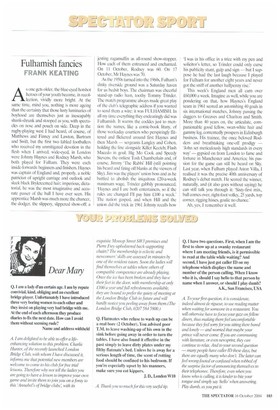Fulhamish fancies
FRANK KEATING
As one gets older, the blue-eyed hotshot heroes of your youth become, in recollection, vividly more bright. At the same time, mind you, nothing is more ageing than the certainty that those lusty luminaries of boyhood are themselves just as inescapably shank-shrunk and stooped as you, with spectacles on nose and pouch on side. Deep in the rugby-playing west I had heard, of course, of Matthews and Finney and Lawton, Bartram and Swift, but the first two fabled footballers who received my unmitigated devotion in the flesh when I arrived, wide-eyed, in London were Johnny Haynes and Rodney Marsh, who both played for Fulham. They were each inside-forwards: beginners and finishers. Haynes was captain of England and, properly, a noble patrician of upright carriage and outlook and sleek black Brylcrcemed hair; imperious, dictatorial, he was the most imaginative and accurate passer of the ball I have ever seen. His apprentice Marsh was much more the chancer, the dodger, the slippery, slippered show-off; a
jesting ragamuffin as all-round show-stopper. How each of them entranced and enchanted. On 11 October, Rodney was 60. On 17 October, Mr Haynes was 70.
As the 1950s turned into the 1960s, Fulham's dinky riverside ground was a Saturday haven for us bedsit boys. The chairman was cheerful stand-up radio ham, toothy Tommy Trinder. The match programme always made great play of the club's telegraphic address if you wanted to send them a wire: it was FULHAMISH. In all my time everything they endearingly did was Fulhamish. It warms the cockles just to mention the names, like a comic-book litany, of those workaday courtiers who perspiringly flittered and flickered around first Haynes and then Marsh — sergeants Langley and Cohen, holding the line alongside Killer Keetch; Flash Maccdo in goal; Big Mo Cook and Speedy Stevens, the onliest Tosh Chamberlain and, of course, Jimmy 'The Rabbi' Hill (still pointing his beard and firing off blanks at the viewers of Sky). Jim was the players' union boss and as he battled to abolish the iniquitous £20-a-week maximum wage, Trinder gabbily pronounced, 'Haynes and I are both entertainers, so if the rules arc changed I'll pay him £100 a week.' The nation gasped, and when Hill and the union did the trick in 1961 Johnny recalls how 'I was in his office in a trice with my pen and solicitor's letter, so Trinder could only curse his publicity stunt, gulp and sign — but! suppose he had the last laugh because I played for Fulham for another eight years and never got the sniff of another halfpenny rise.'
This week's England men all earn over £60,000 a week. Imagine as well, while you are pondering on that, how Haynes's England team in 1961 scored an astonishing 40 goals in six international matches, Johnny passing the daggers to Greaves and Charlton and Smith. More than 40 years on, the articulate, companionable good fellow, swan-white hair and gammy leg, contentedly prospers in Edinburgh business. His trainee, the once beloved Rodders and breathtaking one-off prodigy — 'John set meticulously high standards in every way' — gypsied on from London to fame and fortune in Manchester and America; his passion for the game can still be heard on Sky. Last year, when Fulham played Aston Villa, 1 realised it was the precise 40th anniversary of Rodney's debut match. He scored the winner, naturally, and (it also goes without saying) he can still talk you through it: 'Sixty-first min., ball conies over, right-foot volley, 25 yards, top corner, rigging hisses, goalie no chance.'
Ah, yes, I remember it well.










































































































 Previous page
Previous page